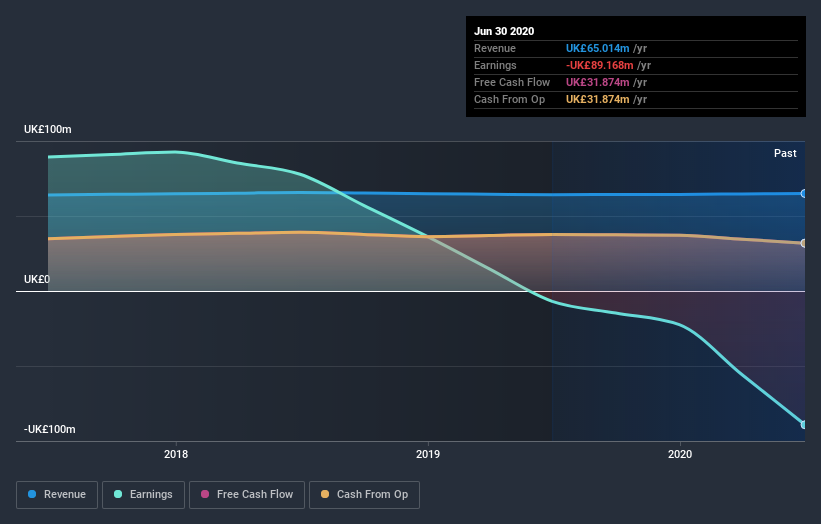- United Kingdom
- /
- REITS
- /
- LSE:BCPT
How Many BMO Commercial Property Trust Limited (LON:BCPT) Shares Do Institutions Own?

A look at the shareholders of BMO Commercial Property Trust Limited (LON:BCPT) can tell us which group is most powerful. Institutions will often hold stock in bigger companies, and we expect to see insiders owning a noticeable percentage of the smaller ones. We also tend to see lower insider ownership in companies that were previously publicly owned.
With a market capitalization of UK£604m, BMO Commercial Property Trust is a decent size, so it is probably on the radar of institutional investors. In the chart below, we can see that institutions own shares in the company. We can zoom in on the different ownership groups, to learn more about BMO Commercial Property Trust.
View our latest analysis for BMO Commercial Property Trust

What Does The Institutional Ownership Tell Us About BMO Commercial Property Trust?
Institutional investors commonly compare their own returns to the returns of a commonly followed index. So they generally do consider buying larger companies that are included in the relevant benchmark index.
As you can see, institutional investors have a fair amount of stake in BMO Commercial Property Trust. This can indicate that the company has a certain degree of credibility in the investment community. However, it is best to be wary of relying on the supposed validation that comes with institutional investors. They too, get it wrong sometimes. It is not uncommon to see a big share price drop if two large institutional investors try to sell out of a stock at the same time. So it is worth checking the past earnings trajectory of BMO Commercial Property Trust, (below). Of course, keep in mind that there are other factors to consider, too.

BMO Commercial Property Trust is not owned by hedge funds. Aviva Investors Global Services Limited is currently the largest shareholder, with 20% of shares outstanding. The second and third largest shareholders are BlackRock, Inc. and Investec Wealth & Investment Limited, with an equal amount of shares to their name at 5.0%.
A deeper look at our ownership data shows that the top 25 shareholders collectively hold less than half of the register, suggesting a large group of small holders where no single shareholder has a majority.
While it makes sense to study institutional ownership data for a company, it also makes sense to study analyst sentiments to know which way the wind is blowing. As far I can tell there isn't analyst coverage of the company, so it is probably flying under the radar.
Insider Ownership Of BMO Commercial Property Trust
The definition of company insiders can be subjective and does vary between jurisdictions. Our data reflects individual insiders, capturing board members at the very least. Management ultimately answers to the board. However, it is not uncommon for managers to be executive board members, especially if they are a founder or the CEO.
Insider ownership is positive when it signals leadership are thinking like the true owners of the company. However, high insider ownership can also give immense power to a small group within the company. This can be negative in some circumstances.
Our most recent data indicates that insiders own less than 1% of BMO Commercial Property Trust Limited. It seems the board members have no more than UK£151k worth of shares in the UK£604m company. Many tend to prefer to see a board with bigger shareholdings. A good next step might be to take a look at this free summary of insider buying and selling.
General Public Ownership
The general public, mostly retail investors, hold a substantial 57% stake in BMO Commercial Property Trust, suggesting it is a fairly popular stock. This size of ownership gives retail investors collective power. They can and probably do influence decisions on executive compensation, dividend policies and proposed business acquisitions.
Next Steps:
It's always worth thinking about the different groups who own shares in a company. But to understand BMO Commercial Property Trust better, we need to consider many other factors. For instance, we've identified 2 warning signs for BMO Commercial Property Trust (1 doesn't sit too well with us) that you should be aware of.
Of course this may not be the best stock to buy. So take a peek at this free free list of interesting companies.
NB: Figures in this article are calculated using data from the last twelve months, which refer to the 12-month period ending on the last date of the month the financial statement is dated. This may not be consistent with full year annual report figures.
If you’re looking to trade BMO Commercial Property Trust, open an account with the lowest-cost* platform trusted by professionals, Interactive Brokers. Their clients from over 200 countries and territories trade stocks, options, futures, forex, bonds and funds worldwide from a single integrated account. Promoted
Valuation is complex, but we're here to simplify it.
Discover if Balanced Commercial Property Trust might be undervalued or overvalued with our detailed analysis, featuring fair value estimates, potential risks, dividends, insider trades, and its financial condition.
Access Free AnalysisThis article by Simply Wall St is general in nature. It does not constitute a recommendation to buy or sell any stock, and does not take account of your objectives, or your financial situation. We aim to bring you long-term focused analysis driven by fundamental data. Note that our analysis may not factor in the latest price-sensitive company announcements or qualitative material. Simply Wall St has no position in any stocks mentioned.
*Interactive Brokers Rated Lowest Cost Broker by StockBrokers.com Annual Online Review 2020
Have feedback on this article? Concerned about the content? Get in touch with us directly. Alternatively, email editorial-team (at) simplywallst.com.
About LSE:BCPT
Balanced Commercial Property Trust
The trust is a vehicle for investors who wish to gain exposure to prime UK commercial property.
Moderate growth potential with mediocre balance sheet.
Similar Companies
Market Insights
Community Narratives




